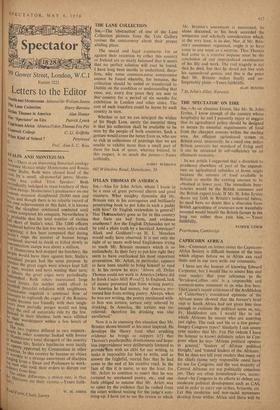SIR, — Alas for John Arlott, whom I know to be a
man of great personal charm and good manners. What naughty dynamite did Mr. Brinnin mix in his courageous and brilliantly penetrating book to put John in such a paddy with him? Or English reviewdom in general? Has Thdlmasolatry gone so far in this country that facts are bad form, and evidence anathema? Are the English Dylansides not to be told a plain truth by a heretical American? Alack and Goddam I —as H. L. Mencken would sadly have observed. It is not only the sight of so many well-bred Englishmen trying to teach Mr. Brinnin manners which is so melancholy. In their fury to put him right they seem to have overlooked his most important proposition. Mr. Arlott, in particular, appears to have been unable to bring himself to read it. In his review he says: 'Above all. Dylan Thomas could not work in America [where did he finish Under Milk Wood?]. In England, lack 'of money prevented him from writing poetry. In America he had money, but America pre- vented him from writing poetry. Always, when he was writing, the poetry unreleased with- in him was torture, torture only relieved by drinking. In America, the torture was un- relieved: therefore his drinking was also unrelieved.' Now it is in assessing this situation that Mr. Brinnin shows himself at his most inspired. He develops the theory (and what crushing evidence he brings to support it!) that Thomas's psychopathic drunkenness and hope- less improvidence were deliberately fostered to providetim with an alibi for not writing, to make it impossible for him to write, and to answer the frightful, mortal fear that he had come to the end of his creative road. In the faceof this it is naive, to say the least, for Mr. Arlott to continue to assert that he was tortured by unreleased poetry, etc.. and one feels obliged to assume that Mr. Arlott was so upset by the evidence that he rushed from the court without waiting for the judge's sum- ming-up. I have yet to see the review in which Mr. Brinnin's assessment is mentioned, let alone discussed, or his book accorded the temperate and scholarly consideration which, at the very least, is its due. Nor, if Mr. Brin- nin's assessment registered, ought it to have come in any sense as a surprise. That Thomas had come to a creative impasse must be the conclusion of any unprejudiced examination of his life and work. The real tragedy is not that. he died, but that dared not live with his squandered genius, and this is the point that Mr. Brinnin makes finally and un- forgettably plain.—Yours faithfully,
7 St. John's Alley, Norwich
ALAN HUNIER










































 Previous page
Previous page